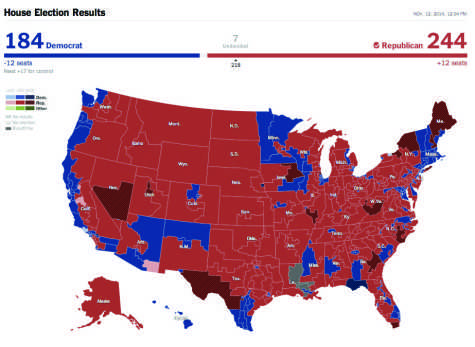Wave of Republicans wash over Congress
With the mid-term elections in the rear-view mirror, it is important to reflect on the history of politics in America, and how history has influenced today’s election. Going back to the 1948 election, Harry Truman campaigned against the “Do Nothing Congress,” complaining that Republicans in the U.S. House and Senate had done little actual legislating, preferring to spend their time blocking his legislative priorities. However, Truman’s “Do Nothing” Republicans did manage to pass 906 bills over two years, roughly five times the number of bills passed by our current Congress, which has only passed 184 bills so far. So, many contend that the current Congress has really raised ‘do nothing’ to a whole new level.
Depending on your political view, this is either a good thing or a bad thing. On the GOP (Republican) side, fundamental opposition to President Obama’s legislative agenda has made refusing to legislate a form of resistance against President Obama’s policies. On the Democratic side, the GOP-controlled House’s refusal to act is painted as the worst form of partisan politics. From either perspective, or from anywhere in between, our previous Congress has been in serious gridlock. The question now is whether anything will change with the Republican wave that has washed over the mid-terms. The GOP has expanded its majority in the House and has taken control of the Senate, all of which will take effect in January, when the new Congress is sworn in. Will we see anything come from Congress now? And if Congress does start to pass more bills, will there be anything we’d want to see? Or anything that President Obama will approve of?
The Blake Upper School is divided on these questions. Many saw little change with the recent elections, expecting another standstill. Micah Cohn ‘17 stated, “There’s likely going to be a complete standstill with the occasional bipartisan bill, but apart from that, nothing will get done.” At the same time, some predicted increased productivity, but in a direction of increasingly conservative legislation. In the words of Madison Ethen ‘15, “if the government moves at all, its going to be in conservative direction. Its going to be legislation that seeks to get rid of past acts passed during this most recent term. It will be like taking a step forward, and taking another one backwards.” However, some students took it as a sign that the country was heading in a new direction of progress and positive change. Ryan Brazner ’16 said, “It’s a sign of real change, and hopefully our government may finally get moving.” Niki Anderson ’17 echoed similar sentiments, stating “It shows that people are disappointed with the current state of the government and its lack of productivity. Maybe this recent election will finally get Congress moving.”
Whether these hopes will be realized remains to be seen. With highly controversial issues like the Affordable Care Act and Immigration Reform currently on the floor, most students, regardless of political affiliation, hope Congress will not be plagued by a continuing partisan gridlock.









